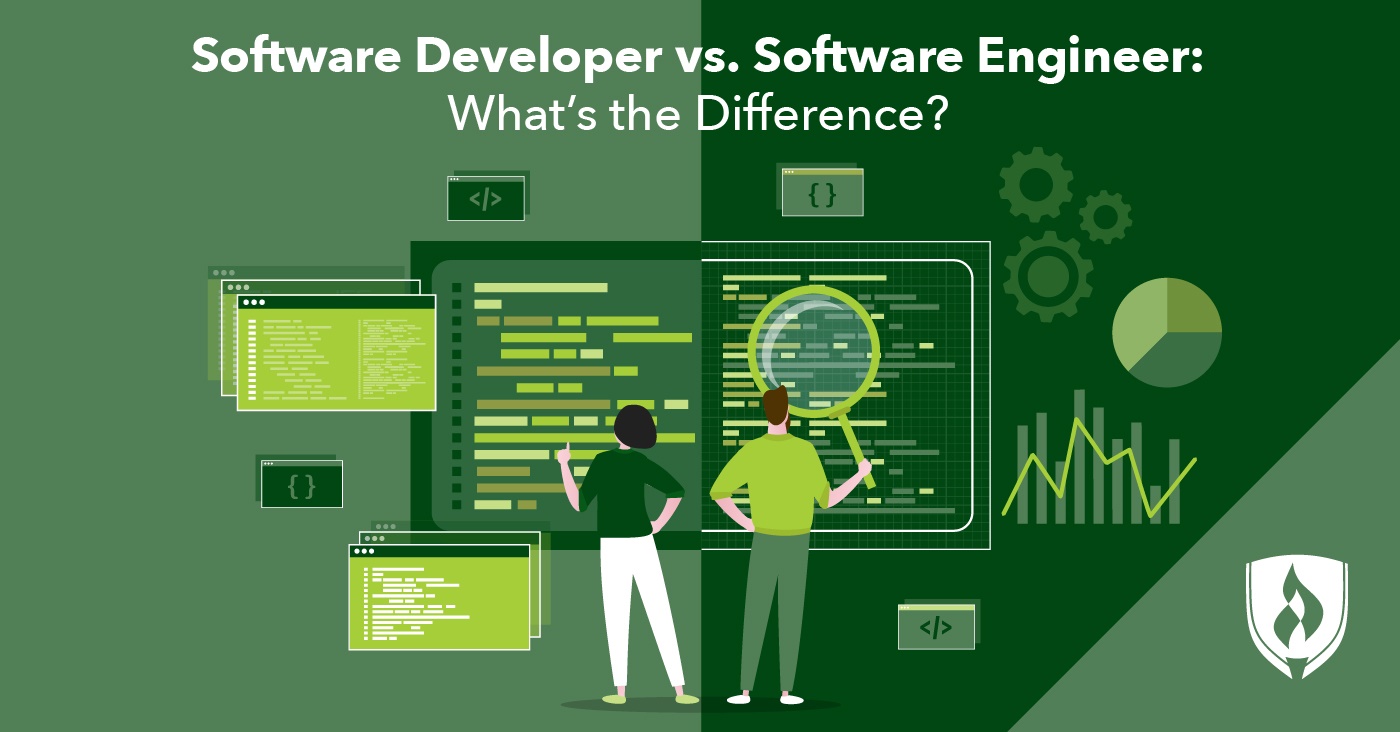
It’s no secret that careers related to software development are having a bit of a renaissance. We live in a world where there’s an app for practically anything a few taps away, from the stupidly silly to the incredibly useful—and there’s a need for skilled professionals who can help design, build and maintain these programs.
With that in mind, the potential financial and job opportunity benefits of pursuing this career field might seem obvious. But less obvious is deciding—and discerning—between the specific roles of software developer versus software engineer. What makes these important software careers different? Do they overlap? How do you know which option is best for your plans?
“In the industry, you’ll find that these titles are sometimes mistakenly used interchangeably; however, they are in fact different,” says Melanie McSally, CEO and founder of WyzeTribe®.
McSally says the roles are both essential components to a team since software developers and software engineers tend to have different skill sets and areas of focus. “These two mindsets will have different approaches and perspectives.”
If you are thinking of getting started in this career field, you need a better idea of what differentiates these careers. Read on to discover the essential differences between software developers and software engineers.
Software developers vs. software engineers: The basic roles
While both are ultimately working on software projects, there is typically a distinction in where their efforts are focused. Software engineers are often tasked with devising the big picture plan for making a feature or application work while software developers may focus on creating and connecting the individual elements laid out by the engineer.
“Software developers care about everything that engineers do—but on a restricted scope,” says Ben Hartwig, CSO and head software engineer at InfoTracer ®. Hartwig also explains that software developers often use ready-made tools and libraries to build their creations and focus on making sure software applications run smoothly across various types of computer devices.
Software developers tend to find solutions with creativity and out-of-the-box thinking, according to McSally. “They are more likely to have on-the-job training and work by trial and error. Their solutions can be quite genius and innovative, though they don’t typically base those solutions in engineering principles.”
In contrast, software engineers tend to approach their work with methodical, foundational concepts. “A software engineer has the education and training to utilize scientific methods and engineering principles to create solutions,” McSally says. She emphasizes that this approach is true across all types of engineering and remains true in software. “Engineers consider all aspects of their solution, from how it will traverse through the project life-cycle to how it will interact in its home environment once deployed.”
How do software developers and software engineers work together?
This can be a complicated question to answer depending on how the organization structures its development team and defines its roles. Because there can be a significant overlap in skills, some organizations may not differentiate between engineers and developers.
For those that do, it can help to think of how a professional restaurant kitchen operates. The head chef (a software engineer) sets the overall vision for what will be included in the meal. They have the skill set to know what works well together as a complete meal as well as how to execute the cooking. The sous chefs (software developers) are tasked with executing the individual elements needed to make the head chef’s vision work.
There are a lot of overlapping skills between the roles, and like with the kitchen metaphor, it’s fairly common to move between these positions throughout a career. That said, a software engineer generally has more authority in a development team hierarchy and is much more focused on the big picture technical demands of a project.
What does a day in the life of a software engineer or developer look like?
While there are differences in the specific types of work they’ll take on, software developers and software engineers often wind up with similar schedules. Most will actively work on at least one major project and will often have smaller projects or tasks in the mix for a given day. Depending on the project management style of the organization, they may start (and potentially end) their workdays with a quick check-in meeting where the team can prioritize work and identify what’s falling behind schedule.
“My day at work starts with a nice cup of hot tea and an internal web development team scrum meeting,” says Sylv Zarzycki, developer at designdough. “These morning meetings are definitely the highlight of my day as they’re a great chance to talk to everyone and motivate each other for what’s to come.”
Outside of these meetings and regroups, most software developers and engineers will have the opportunity to settle into a working rhythm where they can focus intently on the day’s most pressing projects.
“After lunch, it’s the plug-in block of time for me,” Zarycki says. “This is when I put my headphones on and spend time building the main web project of my week.”
In addition to the “big project” time, much of the rest of the day is often consumed by addressing small troubleshooting tasks, responding to emails, reviewing code, attending client meetings and coordinating with the larger team.
“My job is full of collaborations with other developers, designers and copywriters,” Zarycki says. “We take part in workshops, meetings, we organize web training sessions for clients. It’s definitely far from boring. I honestly can’t believe how quickly days go by.”
Software developers vs. software engineers: Education and experience needed
It probably won’t come as a surprise, but both of these highly technical roles are likely to require a college education. Our analysis of over 78,000 software development job postings from the past year found that 92 percent were seeking candidates with a Bachelor’s degree at a minimum.1 For software engineers, 94 percent of job postings were seeking candidates with a Bachelor’s degree at minimum.2
Both roles require a similar level of education, so how do they stack up when it comes to experience requirements? Here’s what we found by examining those job postings.
Software developer listed experience requirements by percentage of job postings:1
- 0 to 2 years:3 percent
- 3 to 5 years:5 percent
- 6 to 8 years:2 percent
- 9+ years:7 percent
Software engineer listed experience requirements by percentage of job postings:2
- 0 to 2 years:8 percent
- 3 to 5 years:9 percent
- 6 to 8 years:4 percent
- 9+ years:9 percent
As you can see, there’s still a similar breakdown of experience requirements, though it appears many software engineering roles may have a slightly higher bar for experience. Keep in mind this analysis can be skewed by subtle differences in employers’ perspectives. For example, do they want two years of experience as a software engineer specifically or two years of experience working a closely related role?
Software developers vs. software engineers: Important skills
There’s also substantial overlap in the technical skills needed for these roles, according to our job posting analysis. Both roles typically seek candidates with a strong understanding of SQL, Java®, JavaScript®, C#, C++ and Python®.1,2
The big differentiator here is how these skills apply and on what scale, according to Gary Stevens, founder and front-end developer of Hosting Canada. “Software developers build software from scratch, such as a web application. Software engineers, on the other hand, apply engineering principles to the designing, development, maintenance and evaluation of software, dealing with large-scale issues systematically.”
Developers do pretty much what engineers do but on a smaller scale and are generally more creative in their work, Stevens says.
Software developers vs. software engineers: How to choose?
With so many similarities between these two careers—how could someone choose the best fit? There’s no set-in-stone blueprint for either, but McSally says those who have a passion for math and science, like order and structure, and tend to think more analytically and systematically tend to fit best in software engineering roles.
“If you’re more of a free spirit, color outside of the lines, think of rules as more of a suggestion and tend to think more creatively than analytically, then software developer might be the role for you,” McSally says.
Stevens largely echoes that line of thought.
“If you like the thought of systematic ways of solving problems, you should look at being a software engineer; and if you like the thought of creatively solving problems, then software development is probably what you want to go for,” Stevens says.
Software development vs. software engineering: The path for you
Are you thinking a software development or software engineering career could be a good choice for your future? Whichever way you are leaning—both of these careers start with an education that covers the foundations of computer science.
If you could use a little more detail into what kind of person thrives in these roles—and if that person might be you—check out “8 Signs You Should Consider Becoming a Software Developer.”
1Burning-Glass.com (analysis of 78,367software developer job postings, Mar. 01, 2021 - Feb. 28, 2022)
2Burning-Glass.com (analysis of 363,692 software engineer job postings, Mar. 01, 2021 - Feb. 28, 2022)
WyzeTribe is a registered trademark of Wyzetribe LLC.
InfoTracer is a registered trademark of Accucom Corporation.
Java and JavaScript are registered trademarks of Oracle Corporation.
Python is a registered trademark of The Python Software Foundation, Inc.




